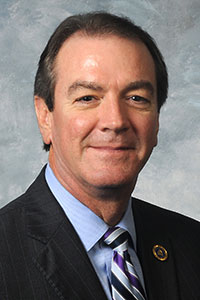FRANKFORT, Ky. — When the time comes to reopen businesses, Kentucky needs to be prepared. That is the message that lawmakers in the Kentucky House are sending with the strong, bipartisan (88-3) passage of an amended version of SB 136 earlier Wednesday.

“This isn’t about politics and it’s never been about politics. This is about keeping Kentuckians safe and being prepared to reengage this economy. It is our constitutional obligation to help our constituents rebuild their lives and livelihoods in the shadow of this pandemic,” House Speaker David Osborne, R-Prospect, said. “Our governor and public health professionals have led us well through this and as a result Kentucky appears to be flattening the curve. But this isn’t a one man show. It’s going to take teamwork to lay the groundwork for what comes next.”
Among the provisions of SB 136 is language that would require licensing and regulatory agencies and organizations to develop guidelines for health care facilities, occupations, and businesses to open and operate safely once Kentucky is past what public health officials consider the critical point of the COVID spread.
According to state Rep. Jerry T. Miller, R-Louisville, these agencies and organizations, including the Kentucky Hospital Association, will use guidance from the Centers for Disease Control (CDC), the Governor’s Office, the Kentucky Department of Public Health and other state and federal agencies. Miller added that hospitals in particular, are struggling now but will be relied on to play a big role in the recovery.
“Hospitals across the state have furloughed or reduced the hours of more than a thousand employees. At the same time, patients go without medical care that can dramatically improve their health and quality of life and exam rooms sit empty,” Miller added. “Our hospitals were among the first in the nation to cancel elective procedures, leaving hundreds of people waiting for a wide variety of surgeries.”
Another provision aimed at expanding health care options would allow chiropractic care if the licensed chiropractor follows CDC guidelines for safe practice and procedure requirements.
State Rep. Kevin Bratcher, R-Louisville, said, “We are the only state in the nation that doesn’t deem chiropractors as ‘essential.’ They’re a valuable part of the health care system and treat patients with debilitating headaches, back pain and other conditions. It is time to recognize their role.”
The health care, and especially mental health, of Kentucky’s families and children during these stressful times are addressed in SB 136. This legislation directs the Cabinet for Health and Family Services to allow Medicaid reimbursements for the services of certified Community Health Workers (CHW). It also requires the state to create an operational framework to establish one certified contracted CHWs (not to be state employee) to work with each of the 858 FRYSCs across the commonwealth.
“This is just one way we hope to address the mental health needs of families and children, worsened by the COVID-19 crisis. We’re giving more tools to a system we know works well – our FRYSCs,” House Health and Welfare Committee Chair Kim Moser, R-Taylor Mill, said.
In addition, the bill also includes language that exempts first responders who come to Kentucky to assist with COVID-19 and other emergencies and disasters to be exempt from the state income tax. The language originally passed the House as HB 449 and was sponsored by Rep. Myron Dossett, R-Pembroke.
“This is pretty straightforward,” Dossett added. “The women and men who come here to help our people should not have to deal with this.”
Speaker Osborne added that this bill is the third measure approved by the House to help the governor and state deal with the COVID-19.
“We’re not talking about flipping a switch and trying to return to business as usual overnight. We are offering a measured, gradual way forward that takes us from focusing on what’s essential to deciding what can be done safely,” Osborne said. “We have to be every bit as successful in recovery as we have been in dealing with the spread. This legislature has a proven record of building the economy. Until now, our state has experienced record economic growth, new jobs, and investment. We can get there again, but we need to work together to do it.”
The bill now goes to the Senate for consideration in the final hours of the 2020 Session.




















Add Comment